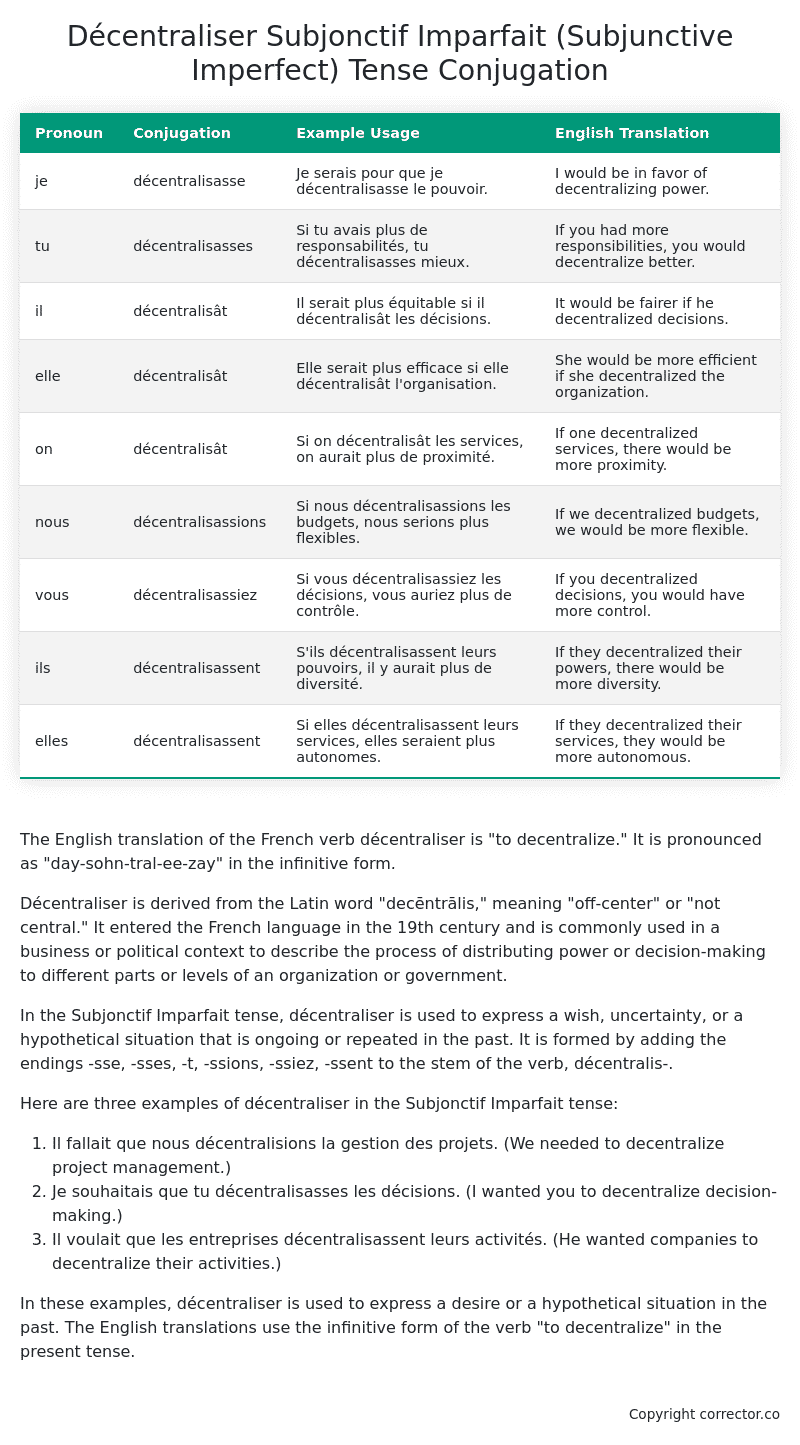Subjonctif Imparfait (Subjunctive Imperfect) Tense Conjugation of the French Verb décentraliser
Introduction to the verb décentraliser
The English translation of the French verb décentraliser is “to decentralize.” It is pronounced as “day-sohn-tral-ee-zay” in the infinitive form.
Décentraliser is derived from the Latin word “decēntrālis,” meaning “off-center” or “not central.” It entered the French language in the 19th century and is commonly used in a business or political context to describe the process of distributing power or decision-making to different parts or levels of an organization or government.
In the Subjonctif Imparfait tense, décentraliser is used to express a wish, uncertainty, or a hypothetical situation that is ongoing or repeated in the past. It is formed by adding the endings -sse, -sses, -t, -ssions, -ssiez, -ssent to the stem of the verb, décentralis-.
Here are three examples of décentraliser in the Subjonctif Imparfait tense:
- Il fallait que nous décentralisions la gestion des projets. (We needed to decentralize project management.)
- Je souhaitais que tu décentralisasses les décisions. (I wanted you to decentralize decision-making.)
- Il voulait que les entreprises décentralisassent leurs activités. (He wanted companies to decentralize their activities.)
In these examples, décentraliser is used to express a desire or a hypothetical situation in the past. The English translations use the infinitive form of the verb “to decentralize” in the present tense.
Table of the Subjonctif Imparfait (Subjunctive Imperfect) Tense Conjugation of décentraliser
| Pronoun | Conjugation | Example Usage | English Translation |
|---|---|---|---|
| je | décentralisasse | Je serais pour que je décentralisasse le pouvoir. | I would be in favor of decentralizing power. |
| tu | décentralisasses | Si tu avais plus de responsabilités, tu décentralisasses mieux. | If you had more responsibilities, you would decentralize better. |
| il | décentralisât | Il serait plus équitable si il décentralisât les décisions. | It would be fairer if he decentralized decisions. |
| elle | décentralisât | Elle serait plus efficace si elle décentralisât l’organisation. | She would be more efficient if she decentralized the organization. |
| on | décentralisât | Si on décentralisât les services, on aurait plus de proximité. | If one decentralized services, there would be more proximity. |
| nous | décentralisassions | Si nous décentralisassions les budgets, nous serions plus flexibles. | If we decentralized budgets, we would be more flexible. |
| vous | décentralisassiez | Si vous décentralisassiez les décisions, vous auriez plus de contrôle. | If you decentralized decisions, you would have more control. |
| ils | décentralisassent | S’ils décentralisassent leurs pouvoirs, il y aurait plus de diversité. | If they decentralized their powers, there would be more diversity. |
| elles | décentralisassent | Si elles décentralisassent leurs services, elles seraient plus autonomes. | If they decentralized their services, they would be more autonomous. |
Other Conjugations for Décentraliser.
Le Present (Present Tense) Conjugation of the French Verb décentraliser
Imparfait (Imperfect) Tense Conjugation of the French Verb décentraliser
Passé Simple (Simple Past) Tense Conjugation of the French Verb décentraliser
Passé Composé (Present Perfect) Tense Conjugation of the French Verb décentraliser
Futur Simple (Simple Future) Tense Conjugation of the French Verb décentraliser
Futur Proche (Near Future) Tense Conjugation of the French Verb décentraliser
Plus-que-parfait (Pluperfect) Tense Conjugation of the French Verb décentraliser
Passé Antérieur (Past Anterior) Tense Conjugation of the French Verb décentraliser
Futur Antérieur (Future Anterior) Tense Conjugation of the French Verb décentraliser
Subjonctif Présent (Subjunctive Present) Tense Conjugation of the French Verb décentraliser
Subjonctif Passé (Subjunctive Past) Tense Conjugation of the French Verb décentraliser
Subjonctif Imparfait (Subjunctive Imperfect) Tense Conjugation of the French Verb décentraliser (this article)
Conditionnel Présent (Conditional Present) Tense Conjugation of the French Verb décentraliser
Conditionnel Passé (Conditional Past) Tense Conjugation of the French Verb décentraliser
L’impératif Présent (Imperative Present) Tense Conjugation of the French Verb décentraliser
L’infinitif Présent (Infinitive Present) Tense Conjugation of the French Verb décentraliser
Struggling with French verbs or the language in general? Why not use our free French Grammar Checker – no registration required!
Get a FREE Download Study Sheet of this Conjugation 🔥
Simply right click the image below, click “save image” and get your free reference for the décentraliser Subjonctif Imparfait tense conjugation!

Décentraliser – About the French Subjonctif Imparfait (Subjunctive Imperfect) Tense
Formation
Common Everyday Usage Patterns
Interactions with Other Tenses
Subjonctif Présent
Indicatif Passé Composé
Conditional
Conditional Perfect
Summary
I hope you enjoyed this article on the verb décentraliser. Still in a learning mood? Check out another TOTALLY random French verb conjugation!


